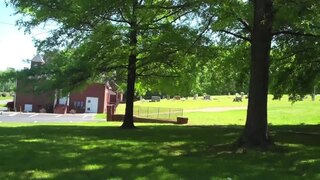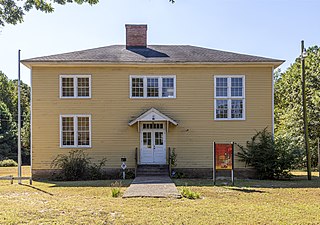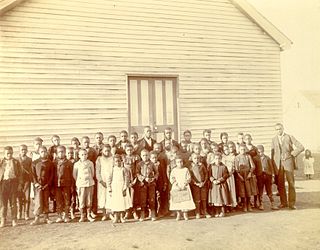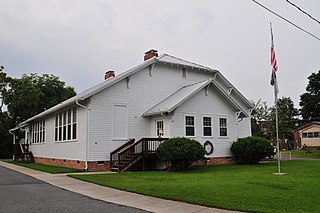
Madison County is a county located in the U.S. state of North Carolina. As of the 2020 census, the population was 21,193. Its county seat is Marshall. Madison County is part of the Asheville, NC Metropolitan Statistical Area.

Snow Hill is a town in Greene County, North Carolina, United States. The population was 1,595 at the 2010 census. It is the county seat of Greene County and is part of the Greenville Metropolitan Area. Snow Hill hosts numerous tennis tournaments during the year. Snow Hill is home to the Green Ridge Racquet Club. Many junior players and adults travel to Snow Hill in order to play in the USTA Sanctioned tournaments.

The Rosenwald School project built more than 5,000 schools, shops, and teacher homes in the United States primarily for the education of African-American children in the South during the early 20th century. The project was the product of the partnership of Julius Rosenwald, a Jewish-American clothier who became part-owner and president of Sears, Roebuck and Company and the African-American leader, educator, and philanthropist Booker T. Washington, who was president of the Tuskegee Institute.
The H. B. Sugg High School, also known as Farmville Colored School, is a historic segregated public high school for African American students located in Farmville, North Carolina, United States. It is listed as the H. B. Sugg School on the National Register of Historic Places listings since November 9, 2020 for its educational history and cultural history.

San Domingo School, also known as Sharptown Colored School and Prince Hall Masons Unity Lodge No. 73, is a historic Rosenwald School building located at Sharptown, Wicomico County, Maryland. It was built in 1919, and is a two-story, rectangular frame building with a hipped roof. It is one of four surviving Rosenwald schools in Wicomico County. The school had only four teachers and remained in use as a school until 1957.

Liberty Colored High School is a former high school for African-American students in Liberty, South Carolina during the period of racial segregation. It originally was called Liberty Colored Junior High School. The building is now a community center known as the Rosewood Center. It is at East Main Street and Rosewood Street in Liberty. The school was built in 1937 on the site of a Rosenwald school that had burned down.
Green County Schools is a PK–12 graded school district serving Greene County, North Carolina. Its six schools serve 3,348 students as of the 2010–11 school year.

Cadentown School in Lexington, Kentucky was a primary public school for black children in the segregated Fayette County Public Schools from about 1879 to 1922. The building that originally housed Cadentown School, located at 705 Caden Lane, is no longer extant. However, the Rosenwald Fund School is listed on the National Register of Historic Places in Fayette County.

Mt. Zion Rosenwald School, also known as Mt. Zion-Rosenwald Colored School, is a historic Rosenwald School building located near Florence, Florence County, South Carolina. It was built in 1925, and is a rectangular frame building with tall exterior windows. It is a "two or three teacher" school building. Construction of the project was funded in part by the Julius Rosenwald Fund, which helped build more than 5,300 black school buildings across the south from 1917 to 1932.

Howard Junior High School, also known as Prosperity School, Shiloh School, and Shiloh Rosenwald School, is a historic Rosenwald school located at Prosperity, Newberry County, South Carolina. It was built in 1924–1925, and is a one-story, frame, double-pile, rectangular building on an open brick pier foundation. It originally had four classrooms; two additional classrooms were added in the 1930s.

Retreat Rosenwald School, also known as the Retreat Colored School, is a historic Rosenwald School located at Westminster, Oconee County, South Carolina.

Coinjock Colored School is a historic Rosenwald school building for African-American students located at Coinjock, Currituck County, North Carolina. It was built in 1920, and is a one-story frame, side-gable-roof, two-classroom school building with American Craftsman style design elements. The school was one of three Rosenwald schools built in Currituck County. It housed a school until 1950.

Greene County Courthouse is a historic courthouse building located at Snow Hill, Greene County, North Carolina. It was built in 1935, and is a two-story, conservative Classical Revival-style brick building. The front facade features a Doric order pedimented portico. The building was constructed under the Works Project Administration.
Zachariah School is a historic Rosenwald School building located near Wooten's Crossroads, Greene County, North Carolina. It was built in 1920, and is a one-story, frame building sheathed in weatherboard and containing three classrooms. An auditorium was added in 1921, but removed about 1967–1969. Zachariah School closed in 1956. The Zachariah School is one of five schools that were constructed using Rosenwald funds in Greene County, including the Snow Hill Colored High School.

Williamston Colored School, also known as E. J. Hayes School and E. J. Hayes High School, is a historic Rosenwald School building located at Williamston, Martin County, North Carolina, USA. It was built between 1930 and 1931 and is a one-story, five-bay, H-shaped, Colonial Revival style red brick building. It has two projecting pedimented gable-front wings, a hipped roof, and large decorative brick panels in a basketweave bond. A three classroom addition was built in 1939.

Walnut Cove Colored School, also known as London School, is historic Rosenwald School located at Walnut Cove, Stokes County, North Carolina. It was built in 1921 with a grant from Sears & Roebuck financier, Julius Rosenwald. A condition of the grant was that it had to have local matching funds. Therefore, it was built on land donated by John William Dalton and his brother George Samuel Dalton and with materials provided by The Dan River Lumber Company.
W. E. B. DuBois School, also known as Wake Forest Graded School (Colored), Wake Forest Colored High School, and Wake Forest-Rolesville Middle School, is a historic Rosenwald School building and school complex located at Wake Forest, Wake County, North Carolina. The elementary school was built in 1926, consists of a one-story, seven-bay, brick veneer, main block with a rear ell and Colonial Revival style design elements. It has a side-gable roof and front portico. The High School Building was built in 1939 with funds provided by the Public Works Administration. It is a one-story, rectangular brick block with a hipped roof and slightly projecting gabled portico. The Agriculture Building/Shop was brought to this site in 1942. It is a one-story, L-shaped brick building, with the addition built about 1952–1953.
Warren County Training School is a historic Rosenwald School located near Wise, Warren County, North Carolina. It was built in 1931, and is a large, one-story, nine classroom brick school. It measures approximately 222 feet by 58 feet, with a rear wing measuring 42 feet by 59 feet. Also on the property are the contributing teacherage (1925), brick cafeteria building, and brick agricultural building. The complex continued to operate as a school until 1970. The Warren County Training School is one of 25 schools that were constructed using Rosenwald funds in Warren County.

Mars Hill Anderson Rosenwald School is a historic school building in Mars Hill, North Carolina.
JoAnn Artis Stevens - Rosenwald Center for Cultural Enrichment.

















